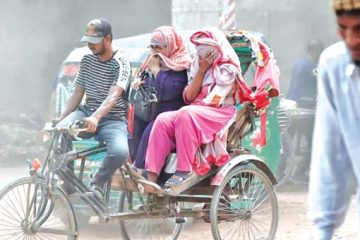Commentary
Sheikh Hasina’s acid test
Mahfuz Anam
The first cabinet will give the clearest sign of her promised change
Two recent elections have been fought on the promise of ‘change’ — Barack Obama’s in the US and Sheikh Hasina’s in Bangladesh — and both of them received resounding endorsement from the electorate and both now have the potential of transforming the politics of their two countries. The similarity can go further if Sheikh Hasina chooses her cabinet with the same circumspection and in-depth thinking as Obama has done, putting premium on expertise, experience and integrity.
Even before Sheikh Hasina has had time to savour her historic victory, she is having to plunge herself into the difficult challenge of picking her cabinet. It is normally a very hard task to choose between party loyalists and those who can provide an efficient government. In our case it becomes harder still as there are so many debts to repay, emotional baggage to respond to and old egos to protect. But Sheikh Hasina has the mandate to ignore all that.
By the time this piece is printed the AL and mohajote chief will probably have already chosen most of her cabinet members. Given her masterly conduct of the elections, especially in eliminating some corrupt but important people from getting nominations, and the very heartening comments in her maiden press conference, I am encouraged to hope that her choices will be based more on efficiency, integrity and management ability, rather than ‘reward for loyalty’. There will of course be some rewarding and back scratching, but they should definitely NOT involve any of the key ministries.
It will be vital for the victorious AL chief to remember that one of the core reasons why Begum Zia’s government failed was because she chose a very bad cabinet. It was totally based on who helped her to win, who gave how much money, who had how many ‘mastans’ in command, who did a better job of thrashing the opposition (in many instances physically so) and who were personally loyal to her and Tarique Rahman. There was no question of expertise, experience and ability. The fact that running the government requires some, however rudimentary, knowledge did not appear to have occurred to the then prime minister. In fact cabinet posts were distributed in such a cavalier manner that they lost any meaning whatsoever. It was widely rumoured that the foreign ministry was awarded after a payment of a sizeable sum. The fact that such an important post was kept vacant for a time and then given to a man whose apparent definition of diplomacy was ‘PR’, which was further defined as throwing lavish dinners and arranging trips for diplomats, lent credence to that rumour.
One can argue that politicians cannot be expected to be experts. The so-called logic is that since they only give policy directions, they might not have any knowledge of their respective ministries. This view might have been applicable once upon a time. It is certainly not so in the 21st century. Every ministry now requires in depth knowledge of the latest scientific discoveries and technological innovations. There is hardly a single area where personal loyalty and party commitment is enough to be on top of things.
It is because the ministers are chosen randomly and with so little consideration for relevant knowledge and experience that the respective ministers fall victims to conniving consultants (both foreign and local) and manipulating bureaucrats (both serving and retired). There are of course exceptions, but exceptions do not make the rule, they in fact, prove it.
At the end of the day, governance is mostly about management. So ministers need to be good managers — meaning in addition to knowing their respective subjects, they need to have human and resource management skills. In today’s world management is the most vital component of governance. It is truer for a country like Bangladesh, where resources are scarce and there are endless things that need to be done.
In selecting her new cabinet Sheikh Hasina’s policy must be to choose the best and the brightest with an announced policy of ‘zero tolerance for corruption, abuse of power, partisanship and inefficiency’. All her cabinet, state and deputy ministers must be willing to make public detailed accounts of their personal assets and liabilities, including that of their immediate family. No one should be included in that august group who is not comfortable with this policy. In her last term she is said to have collected such statements, but lost the moral high ground by not making them public. This time the task is easier since the EC has already made public a part of such information. Forcing her cabinet colleagues to make such information public is a sure way to contain their corruption. And let us not forget, ministers did and do get corrupt.
By delivering the biggest AL victory after 1973, Sheikh Hasina has truly come of her own. She is no longer a leader by default, but by performance. As the architect of her party’s resounding come back she now enjoys a completely different stature, respect, admiration and adulation.
However, because of the stupendous nature of her victory, her responsibility to deliver has become enormous. The key to that delivery is a good, competent and corruption free cabinet. If she chooses the right people, she will have already succeeded halfway. Conversely any wrong choice will make her task that much more difficult. Sheikh Hasina will do well to remember that who ever indulges in corruption, the blame will be hers, and hers alone, as she learnt it the hard way last time.
If she really chooses a ‘zero tolerance for corruption’ policy, which will be clearly indicated by her choice of the cabinet, she can count on the independent media to be at her side to help her implement that policy. Through quick, comprehensive and constant coverage we pledge to help her in freeing Bangladesh of the ignominy of corruption and restore that dignity to our people that they so richly deserve. The swing votes in favour of Awami League and the near complete rejection of BNP and its allies is nothing but the people’s reaction to corruption. Any misreading of this result will be fatal for the victors.
Courtesy: thedailystar.net







